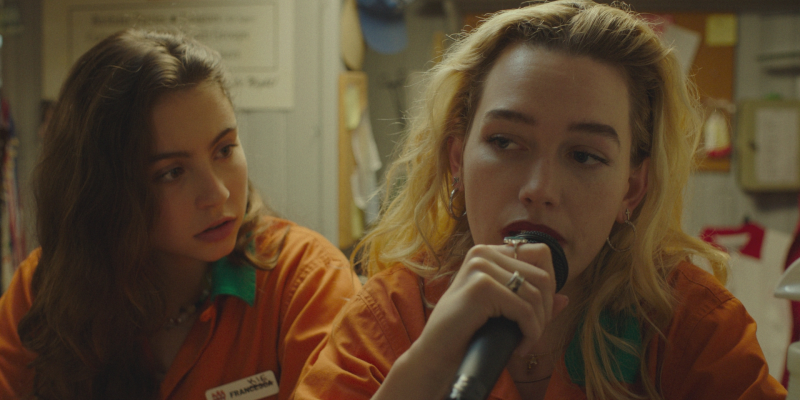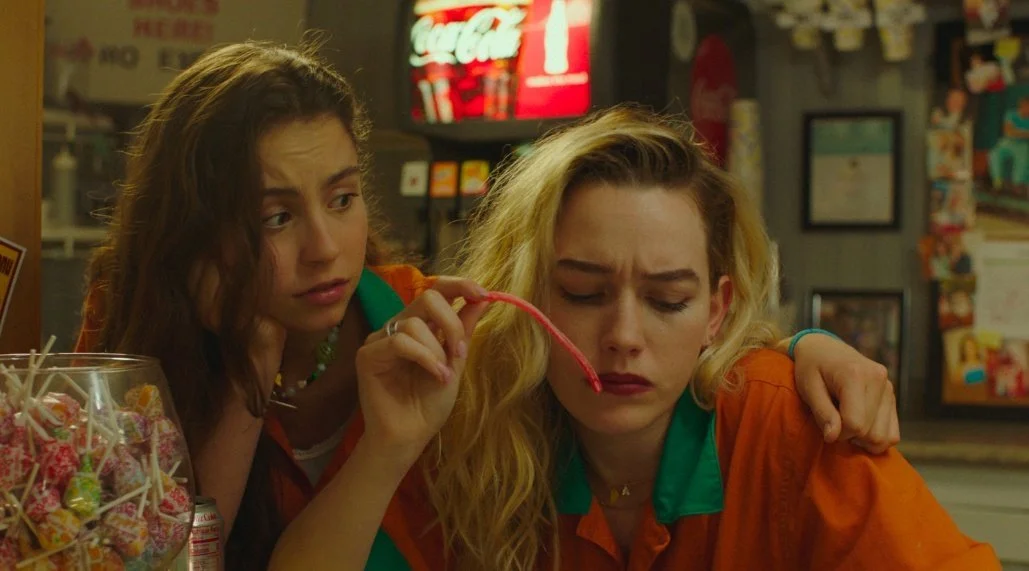Hanna Gray Organschi, Victoria Pedretti, & Carys Douglas Talk “F*ck That Guy”
Connecticut 1992. A simpler time, but no matter when or where in the world you are, the transition from teenage years to adulthood will always be earth-shattering. In Hanna Gray Organschi’s short film, F*ck That Guy, Frankie (Carys Douglas) is about to leave for college, but before she does, she wants to have sex to prove that sex is not a big deal. Frankie recruits her older friend and coworker, Angela (Victoria Pedretti), to help her in this task. Ahead of the short film’s virtual premiere on November 15 (the recording will be available online at that link until 11/29), Organschi, Douglas, and Pedretti sat down to talk about the complex friendship at the heart of the film.
For Organschi and Pedretti, F*ck That Guy marks their second time working together. The first was on Merci, Poppy which was shot in 2022. In the interim three years, a lot has changed for both of them professionally and personally.
“I grew up from that, honestly,” Organschi says. “I watch Victoria, someone who's great at her craft be open to doing her performance in a different way each time based on who was around and what the needs of the group were.”
“I can't speak for how Victoria has changed. She's still really good, that is consistent. But I feel like she allowed me to get more confident as a director. There was an early moment on set with Victoria, the first time, she was very firm with me about whether whatever we were going to talk about, we really needed to do in that moment. That level of precision, directness that feels so firm.”
“Merci, Poppy was this total coming of age for me in terms of my confidence as a director,” continues Organschi. “From first to second film and then onwards into hopefully more, includes not making the same fuckups twice. It helps being around somebody who gives me the grace to play and explore. We like to have a fun time, which is good even when we take the work really seriously.”
courtesy of F*ck That Guy
“I do think that the way that we choose to engage with life really affects what we make and how we make it,” adds Pedretti. “A lot happens in three years that affects the way that we work together. There's a whole, real friendship underneath it now.”
“A director often tries to be sensitive to the needs of an actor, but this time I think I was more acutely aware of what your needs were and how to be more supportive to her,” says Pedretti. “It is interesting to step into that dynamic after knowing each other so well as people because there is kind of an order of things for the sake of efficiency.”
“As her friend, though, I don't want to throw that out the window in order to just be present with whatever's going on with her. Making a movie is stressful, but I think I was more aware of the ways in which I was being shielded from whatever superfluous things were going on that just weren't super relevant to what we were trying to do with the scenes.”
“It's really a treat to work with Hanna,” finishes Pedretti. “I'd like to do it again, and keep seeing how it grows and changes.”
Though you wouldn’t be able to tell from the film, Douglas is a film newcomer. F*ck That Guy marks her debut acting role as Frankie who Organschi describes as a “messy stew of person.” For some, the thought of your first movie role being a complex teenager who has to develop so much emotionally in the span of seventeen minutes is daunting. For Douglas, she felt a freedom to explore Frankie.
“When I first met Hanna, she was so generous. She told me that because I am a young person, I understand this world,” Douglas explains. “That all of that nuance, curiosity, and confusion will be seen, understood, and related to.”
courtesy of F*ck That Guy
“I think it didn't feel super intimidating because, similarly to Frankie who is a young woman around women that she respects, so was I. It was my first film. I was 19 when we filmed it and I was in awe of Hanna, Victoria, and Dagmara Dominczyk. I wanted to do well and was so curious. When I watch the film back, I see now how a lot of the curiosity and nervousness that comes from Frankie, I think was honestly just from myself wanting to do good for these people that I respect.”
“When I described Frankie as a ‘messy stew,’ I felt like I needed to be able to say more than a young person, but for me, that's the same thing,” adds Organschi. “If you say, I want to tell a story about a young woman, people are like, what's she like? I think that ‘messy stew’ is particular and precise to Frankie, but also, I think, any deep dive into the set of feelings that a young person has, is gonna create some sort of weird stew.”
“I like that she gets to be all of herself. I like that she's bold in the same breath that she's insecure. That she feels really confident herself in the same breath that she wants to impress and kind of project a kind of a more mature version of herself. It feels like something messy and just honest to me.”
While Pedretti’s Angela seems so much older to Frankie, the viewer can see that the two have a lot in common. They are both messy stews of young women who have their moments of confidence that are shadowed by crippling insecurity. It’s the impossible-to-describe hubris and insecurity that comes with the teenage and early-twenty years.
courtesy of F*ck That Guy
Recent years have seen an influx of buddy movies about high school girls trying to have sex for the first time or become more confident in their sexuality. Films like Booksmart, Blockers, and The To-Do List all focus on young women taking charge of their sexuality much like Frankie in F*ck That Guy What separates Organschi’s film is that the buddies in the film are at much different places in their lives. Frankie is on the verge of leaving for college while Angela has a small child and is the manager of a bowling alley. As much as the film is about sex, it’s also about the attention Frankie seeks from this older, cooler woman.
“I'm really interested in the power dynamics at play between these two girls who are friends, the baked in power imbalance, and how sex interrupts that or shifts that,” Organschi offers. “I spent a lot of time as a young person thinking about the cool older girls. What they knew, what they'd done, and what they thought about those things. Just the casualness with which they treated things because they had lived life that I didn't yet have access to. I imagined maybe that if I had a certain casualness with which I could treat those same things that maybe my power would skyrocket. Like I could become a peer, you know?”
“It's also a desire for legitimacy,” adds Douglas. “The ability to talk casually about these things is to create connection. From Frankie's point of view, it's very clear all the ways that she and Angela are close, but there is just a major divide of life experience.”
“I've had experiences where I try to bridge that gap to feel closer to somebody that I care about. It's even less like the act of sex itself, and more so the way Frankie tries to speak about it. Angela has this wonderful nonchalance and confidence to her. In Frankie, you see this younger person trying to grapple with that dynamic more than just grappling with the hurdle of sex itself.”
“But also Angela understands that sex is monumental,” jumps in Pedretti. “She takes the time to make it ceremonious. Also, she has a child, so Angela really knows the product of how monumental sex can be.”
“I love that Frankie doesn't really get that, right?” poses Organschi. “That's the generosity of Angela's relationship to Frankie. She meets her where she's at and then realizes she needs to meet her somewhere where she isn't because she needs to pull her into some kind of a deeper thinking.”
“I would never have been able to articulate any of these things or even wish for it in the absence of like working with really great collaborators who make the material, like, way richer than you think it will be. But now that we're on this side of this, and I know these two people, I can talk about it.
courtesy of F*ck That Guy
The film takes place in Connecticut in 1992 with much of the action happening in a duckpin bowling alley where Frankie and Angela work. You can feel the nostalgia seeping through the screen for a time long gone without cell phones tethering us to the world. You could, conceivably, close down a duckpin bowling alley early to get drunk and talk about lofty things like the fact that sex might only be a big deal because the rest of the world has made it one. F*ck That Guy is a love letter to a place Organschi knows well.
“I'm just really fascinated by my tiny pocket of the country,” reflects Organschi. “I'm also a ’90s kid, and I've always been curious about the ways in which that era formed me without me even being aware of it. Really thinking hard about what it was like for my parents to have me in that time as young people and their life experience.”
“I project different ages of myself into that time of becoming and wonder what that set of circumstances might have been like for me. That's a heady way of saying it's such a rich time for me and my creative life.”
Since much of F*ck That Guy takes place in a duckpin bowling alley, it only feels right to ask who among the three is the best bowler. The answer is quick and unanimous: Victoria Pedretti.
“I mean, did you even watch the movie?” laughs Pedretti, referring to the film’s final shot where she bowls an incredible throw to knock down the singular pin left standing.
Support Your Local Film Critic!
~
Support Your Local Film Critic! ~
Beyond the Cinerama Dome is run by one perpetually tired film critic
and her anxious emotional support chihuahua named Frankie.
Your kind donation means Frankie doesn’t need to get a job…yet.
Follow me on BlueSky, Instagram, Letterboxd, YouTube, & Facebook. Check out Movies with My Dad, a new podcast recorded on the car ride home from the movies.




